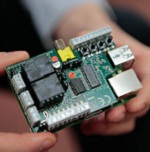 After a festive period of excess, a January diet is one of the most common New Year resolutions for many people. Sticking to it, however, is not so easy, with temptation around every corner and inside every cupboard.
After a festive period of excess, a January diet is one of the most common New Year resolutions for many people. Sticking to it, however, is not so easy, with temptation around every corner and inside every cupboard.
Now, computer experts at the University of Manchester have come up with a unique deterrent – a talking, tweeting chicken guarding your cupboards to shame hungry dieters into abstaining.
The chicken not only barks out orders to sneaky snackers, but even tweets that person's Twitter account to 'name and shame' them if they stray. It uses a Raspberry Pi – a tiny, single-board computer – in conjunction with the PiFace interface, which has been developed by the University's Computer Science Department to power real-life applications.
Raspberry Pi and PiFace are being used to inspire the next generation of computer whizzkids. As well as the cupboard watcher, the university's scientists have helped youngsters to make birdboxes that tweet and photograph birds, to control Scalextric cars and to build interactive toys that react to the weather. London Zoo is also said to be interested in collaborating to record animal movements.
Academics have found that schoolchildren coming into university have a much lower level of technical knowledge than in previous years. The Government is keen on improving how computing is taught in schools using a scientific approach to the subject.
Raspberry Pi was developed by the Raspberry Pi Foundation with the aim of improving teaching of basic computer science in schools. The PiFace devices sit on top of the Raspberry Pi to control the real world – powering motors, controlling robots, triggering cameras and using sensor networks. With the Pi they have all the capabilities of a computer but are more flexible and can be embedded in the real world – costing as little as £40 per kit.
Dr David Rydeheard, from the School of Computer Science, said: "This is an exciting development, taking computing out of its box and allowing schoolchildren to play with the science of computing.
"Schools have physics, chemistry and biology laboratories to teach these subjects. The combination of Raspberry Pi and PiFace creates a cheap personal laboratory for computer science that every child can own.
"The future wealth of our country depends crucially on our expertise in the science and technology of computing. At the moment schools fail to teach their students computing: how to design and build computing systems. Raspberry Pi and PiFace are ideal for schools to use to teach this key subject."
Workshops using Raspberry Pi and PiFace have attracted more than 50 teachers from schools in the North West per session and more recently the university, together with the Museum of Science and Industry, Manchester, has run workshops with children.
Dr Andrew Robinson, who developed the PiFace interface at the university, told the public sector technology newsletter Science Omega: "We want to demonstrate that these are things that anybody can do. Programming is no longer the preserve of highly skilled computer scientists. Schoolchildren can put these programmes together in about 20 minutes. We want to show them how easy and fun computing can be; these devices can connect with whatever the users are interested in."